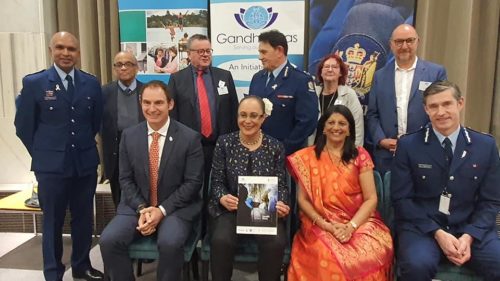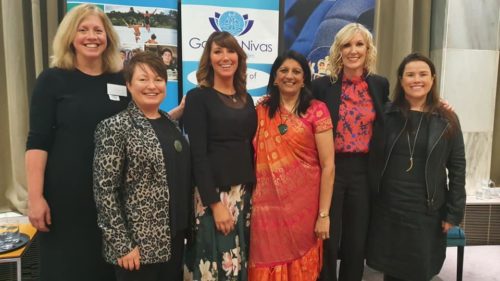
Gandhi Nivas, which helps prevent family harm in New Zealand by providing men with early intervention services, could be expanded throughout the country.
After a five year independent Massey University report of Gandhi Nivas, Pakuranga’s Ranjna Patel, the driving force behind an innovative early intervention programme for family harm, hopes that government agencies including Health, Social Development, Justice, Corrections, Police, Education, Housing and Whanau Ora can work together to replicate it across New Zealand.
Now that the initial groundwork has proved that it has helped reduce family harm by 60 per cent, Ranjna, founder-director of Nirvana Health Group, hopes that the government picks up the ball and runs with it to make it a national programme.
The Massey University evaluation report (fifth year in a row) was recently presented at Parliament House in Wellington. The event was attended by government agencies, ministers, and NZ Police Commissioner.
Police Minister Stuart Nash said, “Family harm is our nation’s shame. We have 150,000 call-outs every year. Ranjna you have saved the lives of women and children and saved families. This is a testament of the fact that the government recognises it.”
Launched in December 2014, Gandhi Nivas was set up to meet the counselling and housing needs of men who are bound by Police Safety Orders (PSOs) and cannot return home.
The free service provides 24/7 assessment and counselling to clients in addition to free accommodation and wrap-around support to victims and children. Intervention services are provided to clients and their families by Sahaayta Counselling Services.
It began with one house in Otahuhu in 2014 and soon grew to include houses in Te Atatu and Papakura. The target group was initially Indian men but now, according to the findings, a third of the people they serve are Maori and a third are Pacific men.
Visibly impressed by the work done, NZ Police Commissioner Andrew Coster said, “Ranjna you are a powerful force for good in the community and I would like to thank you for your commitment to working with partners and police on family violence prevention.
“This is an example of what can be achieved when communities take the lead. One of my priorities is focussed prevention through partnership.”
Emma Powell, chief customer officer ACC said, “We intervene at a point where harm is often occurring with survivors, victims. We have a significant role to play when it comes to the prevention of harm.
“Gandhi Nivas comes in at a point where change can be made. One of the things that strikes me is the ability to innovate – to see a gap and find a solution. The pieces were in place.”
At another event, the following day hosted at Manukau Institute of Technology (MIT) guided by MC Rachel Smalley, the former TV presenter, said it was an honour to be in Parliament where ministers and agencies collectively agreed that this service has changed lives.
The MIT theatre was packed with supporters of the programme including businesswoman Theresa Gattung. District Commander for Counties Manukau Superintendent Jill Rogers, said that in the last 12 months, police have responded to more than 46,000 events.
“Counties Manukau makes up nearly 25,000 of these occurrences. Our staff is called to a family harm episode every four minutes,” Rogers said.
“I would like to make a very special mention of Ranjna Patel, who has long been a partner with Police, and who is an inspiration to us all. I would like to acknowledge the ground-breaking work that you began with the previous District Commander Deputy Commissioner John Tims.”
Rogers said that the wrap-around service for victims, perpetrators and their families was an area that was missing in the police response to families.
She also made a special mention of ACC who had the foresight to invest in this service and to Sahaayta Counselling for its dedicated service.

Talking about a different approach to family harm, Sucharita Varma of Sahaayta Counselling Service said that a lot of their work is to do with unpacking.
“Instead of questioning the perpetrator of crime we first sit them down and provide a hot meal and a bed. We focus on families to let them know that they are safe. We try and find out the triggers that lead to violence and make them aware of it.”
Ranjna said it was a collective effort with so many innovative leaders involved in the journey that started in 2014 when Inspector Rakesh Naidoo presented some data to the Counties Manukau South Asian Advisory Board.
“Four out of 14 women killed in the previous year were Indian. Assistant Commissioner John Tims asked the advisory board to give an insight into the cultural aspect of this data.
“Standing on the sideline, what I heard was men need help, they need counselling, without being in the system, and women need space to feel safe.
“With the support of Sucharita Varma and Zoya Salim Kara of Sahaayta Counselling Service, the seed was planted.
“Now we have a 150-page report that says it works. Family harm costs over $4b to our economy. Each intervention house costs $650,000 working with around 350-400 families. Let’s try to change the shame we have with our family harm stats in New Zealand.”









